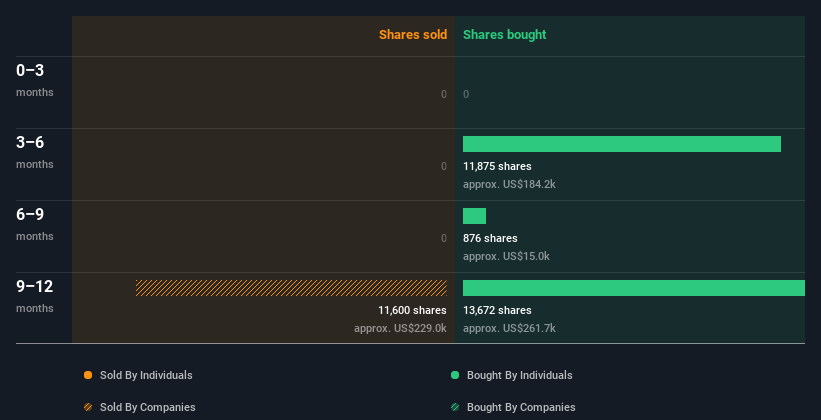Favourable Signals For Boston Omaha: Numerous Insiders Acquired Stock
It is usually uneventful when a single insider buys stock. However, When quite a few insiders buy shares, as it happened in Boston Omaha Corporation's (NYSE:BOC) case, it's fantastic news for shareholders.
While insider transactions are not the most important thing when it comes to long-term investing, we do think it is perfectly logical to keep tabs on what insiders are doing.
View our latest analysis for Boston Omaha
Boston Omaha Insider Transactions Over The Last Year
The Independent Director Jeffrey Royal made the biggest insider purchase in the last 12 months. That single transaction was for US$192k worth of shares at a price of US$19.23 each. So it's clear an insider wanted to buy, even at a higher price than the current share price (being US$15.75). Their view may have changed since then, but at least it shows they felt optimistic at the time. To us, it's very important to consider the price insiders pay for shares. As a general rule, we feel more positive about a stock if insiders have bought shares at above current prices, because that suggests they viewed the stock as good value, even at a higher price.
While Boston Omaha insiders bought shares during the last year, they didn't sell. You can see the insider transactions (by companies and individuals) over the last year depicted in the chart below. By clicking on the graph below, you can see the precise details of each insider transaction!
Boston Omaha is not the only stock insiders are buying. So take a peek at this free list of growing companies with insider buying.
Insider Ownership Of Boston Omaha
Many investors like to check how much of a company is owned by insiders. We usually like to see fairly high levels of insider ownership. Boston Omaha insiders own about US$24m worth of shares. That equates to 4.8% of the company. We've certainly seen higher levels of insider ownership elsewhere, but these holdings are enough to suggest alignment between insiders and the other shareholders.
So What Do The Boston Omaha Insider Transactions Indicate?
There haven't been any insider transactions in the last three months -- that doesn't mean much. However, our analysis of transactions over the last year is heartening. Overall we don't see anything to make us think Boston Omaha insiders are doubting the company, and they do own shares. Therefore, you should definitely take a look at this FREE report showing analyst forecasts for Boston Omaha.
But note: Boston Omaha may not be the best stock to buy. So take a peek at this free list of interesting companies with high ROE and low debt.
For the purposes of this article, insiders are those individuals who report their transactions to the relevant regulatory body. We currently account for open market transactions and private dispositions of direct interests only, but not derivative transactions or indirect interests.
Have feedback on this article? Concerned about the content? Get in touch with us directly. Alternatively, email editorial-team (at) simplywallst.com.
This article by Simply Wall St is general in nature. We provide commentary based on historical data and analyst forecasts only using an unbiased methodology and our articles are not intended to be financial advice. It does not constitute a recommendation to buy or sell any stock, and does not take account of your objectives, or your financial situation. We aim to bring you long-term focused analysis driven by fundamental data. Note that our analysis may not factor in the latest price-sensitive company announcements or qualitative material. Simply Wall St has no position in any stocks mentioned.

 Yahoo Finance
Yahoo Finance 
